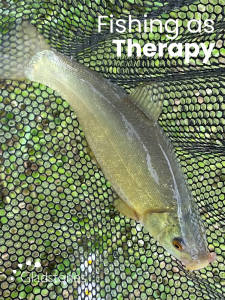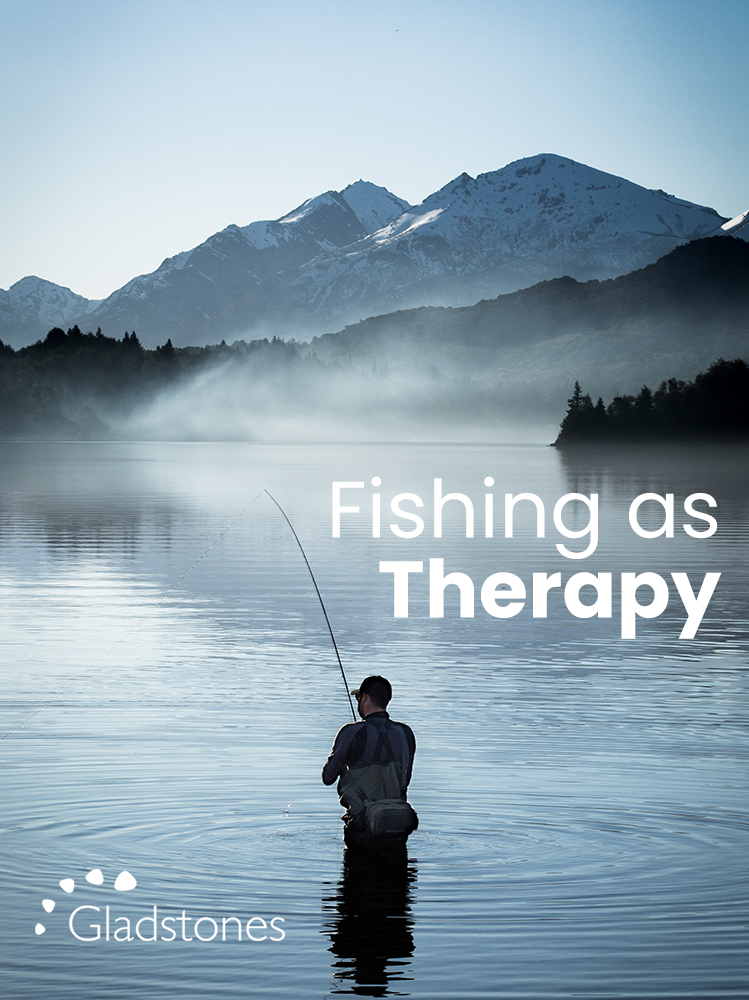I had a friend who ran a fishing project at a local venue, Selwyn Pond, formerly the estate pond of the Lord of the Manor, now in the middle of a deprived council estate. Kids with a whole variety of challenges learned to listen, to be calm, to focus and concentrate on one thing, to be aware of their environment: all through angling. They were outdoors and engaged with nature. They were living in the moment. In effect, they were experiencing mindfulness. Of course, if you told them they were going to practice mindfulness they wouldn’t have shown up, so to them, it was just fishing.
My friend gave me a fishing pole for my young son. I had no idea how to use it but a quick YouTube search solved that problem and one summer day, I took my son fishing. We caught a few small roach and bream until my lad grew bored and went to play on the nearby swings.
Then suddenly something hit my bait harder than before and the float disappeared under and around the water, dragged by my first ever carp. It must have weighed about two pounds and the local anglers were, I think, a little surprised at my exited shouting to my son to come and have a look. They were even more surprised when I insisted on having a photograph taken holding my trophy, which was then released unharmed. Of course, I was hooked, and the picture still hangs on my wall.
Since then, I have graduated to rod and reel, and have caught many more and much larger carp as well as barbel, and tench. I have delved into the world of lure fishing for predators such as perch and pike, and, in search of elegance, fly fishing for trout. I now read, write, paint, think, talk and dream about leviathans and consider myself a competent piscator. I am conscious that fishing has been described as “a stick and a string, with a worm at one end and a fool at the other.”
The “Fishing For Answers; Report by Dr Adam Brown presents a huge amount of persuasive evidence about the positive role that angling can play in improving people’s lives across a wide range of age groups and communities.
It evidences how angling:
- Increases physical activity and assists in recovery from physical illness
- Promotes good mental health
- Provides programmes that assist in the treatment and recovery from addiction
- Helps build people’s relationships and self confidence
- Provides opportunities for ‘active ageing’ and inter-generational relationships
- Increases a sense of community
Angling makes a huge contribution to preventative and restorative health and wellbeing. It is a means by which people access the natural environment, find peace and quiet, de-stress and lessen the likelihood of mental ill health. The report says that 87% of anglers surveyed identified rest and relaxation as an important motivator for participation.
In “The Natural Childhood”, Dr William Bird is quoted as saying “Children who don’t connect with nature before the age of 12 are less likely as adults to connect with nature. They therefore lose out on the resilience nature provides when you’re really stressed”. Angling offers a very intense connection with nature that runs much deeper than most forms of contact. So, getting people involved has many benefits. It is often the first experience of being close to nature and so can form an important link to environmental awareness.
The Catch a Smile project in Gloucester, founded by Danny and Caroline Keene and run with the help of an amazing team of volunteers, takes advantage of this opportunity to promote wellness and community through fishing. In May of this year, Gladstones took its first group of new anglers to the fishery. Most had never fished before in their life, some not since childhood. Some came along just to get some fresh air, blow away the cobwebs and have a change of environment. We took a packed lunch and picnicked by the water.
Everyone who participated caught something, be it roach, bream, crucian carp or tench. All said they had enjoyed the experience, found it relaxing or meditative. Some said it brought back childhood memories. A big part of the experience is realizing that the hours pass without you noticing and suddenly you have enjoyed a whole day, with no need for alcohol or other mood-altering chemicals.
Is there anything prettier in the word than a young Tench?

If you are struggling with mental health issues or have a friend or family member who is struggling with mental health, Gladstones private rehabilitation Clinics can help.
We work with people struggling with mental health and their families on a daily basis in our rehab clinic. We have seen the damage done to everyone involved. We apply our years of experience with the latest integrative treatment models and therapies in our highly successful practice. Gladstones operates two private residential rehab facilities in the South-West of England, and two in London. Our main office and facilities are located in central Bristol.
All Our clinics provide clients with a private room (en-suite) & full board included in the cost of their residential rehabilitation programme. If you need to speak to someone right now for a confidential chat call us Freephone on 0808 258 2350 or email – help@gladstonesclinic.com






